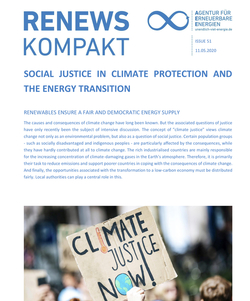Social justice in climate protection and the energy transition
The causes and consequences of climate change have long been known. But the associated questions of justice have only recently been the subject of intensive discussion. The concept of "climate justice" views climate change not only as an environmental problem, but also as a question of social justice. Certain population groups - such as socially disadvantaged and indigenous peoples - are particularly affected by the consequences, while they have hardly contributed at all to climate change. The rich industrialised countries are mainly responsible for the increasing concentration of climate-damaging gases in the Earth's atmosphere. Therefore, it is primarily their task to reduce emissions and support poorer countries in coping with the consequences of climate change. And finally, the opportunities associated with the transformation to a low-carbon economy must be distributed fairly. Local authorities can play a central role in this.
This paper was written for the LECo (Local Energy Communities) project funded by the Interreg Northern Periphery and Arctic Programme of the EU. See the project website localenergycommunities.net for further information.



Social Media